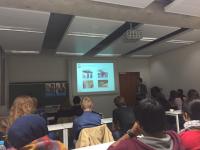On 7 October 2015, UNICEF student team Wageningen organised a seminar 'What is sustainable sanitation in WASH?". Guest speakers were Marielle Snel from IRC, Joshi Deepa professor at Wageningen University, Harold Hoiting from SIMAVI and Luca Peters who represented UNICEF.
Published on: 19/10/2015
Luca Peters, member of the UNICEF student team Wageningen and 2nd year MSc student international land and water management, gave an introduction on WASH and the role of UNICEF in WASH. Policy makers have put drinking water high on the political agenda, but sanitation is considered 'dirty' and has really lagged behind. UNICEF works in more than 100 countries around the world to improve water supplies and sanitation facilities in schools and communities, and to promote safe hygiene practices. UNICEF is also responsible for the WASH provision in refugee camps.
 Marielle Snel from IRC focused on sustainable sanitation and the role of CLTS (Community-Led Total Sanitation). CLTS has been successful to mobilise not only citizens but also governments to improve sanitation conditions. It is a popular approach because it is a relatively simple, does not require large subsidies and it produces quick results. In a CLTS approach the community is the driving force, the community takes care of their own sanitation. But sanitation is a complex issue, which consists of many different aspects. You can't solve the problem with only the CLTS approach. You need to look at the whole system and not one aspect. Leadership, governance support, finance, learning and sharing etc. are very important aspects. It is not easy to deal with the whole system but it is needed to make CLTS work.
Marielle Snel from IRC focused on sustainable sanitation and the role of CLTS (Community-Led Total Sanitation). CLTS has been successful to mobilise not only citizens but also governments to improve sanitation conditions. It is a popular approach because it is a relatively simple, does not require large subsidies and it produces quick results. In a CLTS approach the community is the driving force, the community takes care of their own sanitation. But sanitation is a complex issue, which consists of many different aspects. You can't solve the problem with only the CLTS approach. You need to look at the whole system and not one aspect. Leadership, governance support, finance, learning and sharing etc. are very important aspects. It is not easy to deal with the whole system but it is needed to make CLTS work.
The third speaker was Joshi Deepa, Professor Water Resources Management at Wageningen University. There is a huge gap between research, policy and practice in developing countries. The Millennium Development Goals for sanitation have not been reached. Toilets are built, but not used, cultures depend on their own habits. If people pay for their sanitation, they get ownership, which makes them value sanitation (demand-led approaches), Deepa explained.
The last speaker was Harold Hoiting, Programme Officer WASH at the Dutch NGO Simavi. Simavi strives for a world in which basic health is accessible to all. To improve health, you need safe water, sanitation and hygiene. Like UNICEF, Simavi also focuses on WASH programmes. More than 13 thousand people die each day from diarrhoeal diseases because they use a drinking water source that is contaminated with faeces. Simavi makes people aware of water-related diseases. They improve health by improving the quality, quantity, accessibility and of safe water and improved sanitation and hygiene. They use CLTS as starting point and involve all stakeholders to make it work.